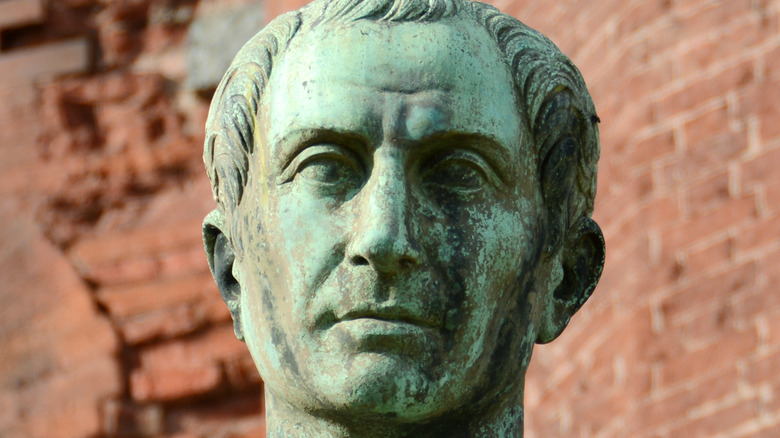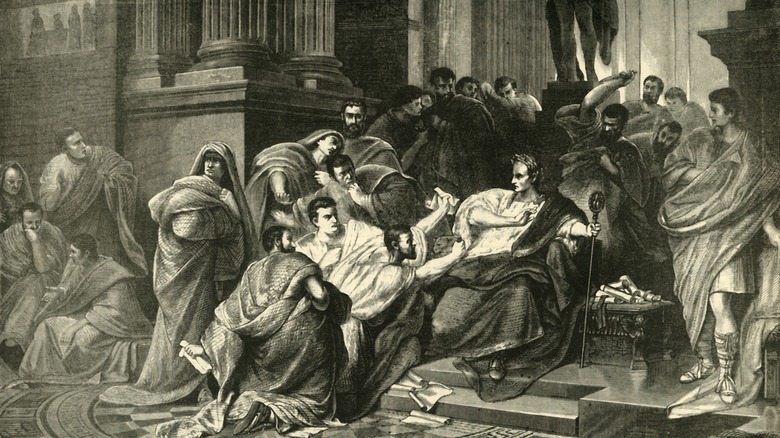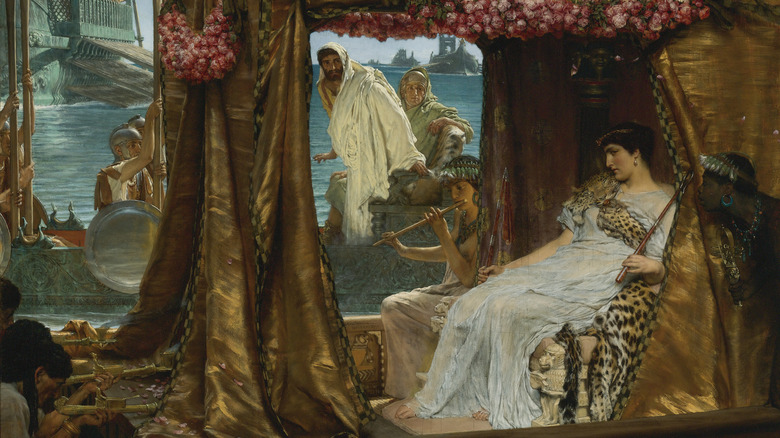Disturbing Details About Julius Caesar's Death
In the course of world history, few events were as momentous as the rule and assassination of the Roman general and dictator Julius Caesar. Even the name "Caesar" itself has evolved to connote rule and power. Part of this comes from the influence Rome has had on western civilization. Even today, a sizable portion of the modern world is still rattling from the big bang explosion that was the Roman Empire.
However, a greater part of Caesar's positive legacy was the fact that he was an extremely popular leader among Rome's citizens (via National Geographic). As a military leader, Caesar the general conquered parts of what are today Spain, France, Germany, Switzerland and Belgium. As a speaker, Caesar the orator was one of history's finest rhetoricians and could enrapture an audience with just his voice. And as a politician, Caesar the lawmaker was shrewd, forming alliances to ensure his rise to power and keeping the citizens of Rome on his side (per Live Science). By 46 B.C., when he was made dictator of Rome — ostensibly for 10 years — Caesar's popularity was already high among Romans, and only increased with numerous reforms, such as granting citizenship to people outside the city, supporting veterans, and regulating grain distribution, to name a few (per History). However, two years into his dictatorship, Caesar, and Rome as people knew it, would be no more.
Julius Caesar was ambushed by Rome's senators
While Caesar was beloved by the citizens of Rome, Rome's senate despised their dictator, resenting Caesar's popularity and what they saw as his arrogance (via National Geographic). Their fears that Caesar the dictator would gain even more power came true in January 44 B.C., when Caesar named himself dictator for life. This became the final straw and the senators became determined to assassinate Caesar (per History). Despite still having the support of much of the senate and Rome's citizens, the senators planned to assassinate Caesar on March 15, 44 B.C. — the Ides of March.
On that day, Caesar was sick and did not plan to attend the meeting in the senate. Only at the urging of a conspirator, Decimus, did Caesar decide to make his way to Rome's senate (via World History). Caesar was accompanied by a massive crowd and his colleague, Mark Antony. As part of the plan, Antony was held up outside by another conspirator, Trebonius, leaving Caesar alone among his murderers.
Inside, he sat on his throne and was handed a petition by a senator named Cimber, who petitioned the dictator on behalf of his exiled brother. After being ignored by Caesar, Cimber drew his knife and struck the first blow, prompting the rest of the conspirators to follow. As many as 60 senators then surrounded and stabbed the dictator 23 times, leaving the 55-year-old Caesar to die at the statue of his old ally and rival, Pompey.
Julius Caesar's death led to war
Murdering an incredibly popular leader in cold blood tends not to draw many supporters and instead often results in political instability. As Julius Caesar once said and what the conspirators should have absorbed, "as a rule, men worry more about what they can't see than about what they can" (per History). What the senators who assassinated Julius Caesar could not see was the civil war that immediately followed after his death.
According to World History, in a not-so-shocking turn of events, Rome's reaction to the assassination of the widely popular Caesar was both one of mourning their fallen leader and the desire to punish the senators. On March 17, the senators attempted to find a compromise, saying that they would keep the laws of Caesar intact and be granted amnesty. This obviously failed and the senators were forced to flee Rome. Under the leadership of Mark Antony, Octavian Caesar (Caesar's grand-nephew and adopted son), Marcus Lepidus (another of Caesar's colleagues), Marcus Brutus and Gaius Cassius (the main conspirators), and other supporters of the senators were defeated in a civil war (via Britannica).
His murder marked the end of Rome's republic
While Julius Caesar making himself dictator for life was a major turning point for the Roman Republic, the war that followed his assassination and its aftermath ended any hope for a return to the old order. After their victory in the civil war following Caesar's assassination, Octavius, Mark Antony, and Lepidus became the Second Triumvirate and shared power in the empire in 43 B.C. (via History).
By 37 B.C., Lepidus had been ousted by Octavius from his position in the Triumvirate, and Antony, who was married to Octavius' sister, Octavia, had begun an affair with Cleopatra, the queen of Egypt. After divorcing Octavia, the remaining two members of the Triumvirate went to war. After defeating Antony and Cleopatra, Octavius became the undisputed ruler of Rome and its first emperor. Now known as Augustus Caesar, the grand-nephew of Rome's first dictator for life would rule for 40 years and double the size of the empire. Roman historians viewed Augustus' reign as the official end of the Roman Republic and the beginning of the Roman Empire (per National Geographic). In their hopes to save Rome's republic and oust what they felt was a tyrant, the conspirators sped up and ensured that the nation would be ruled by a single voice.



